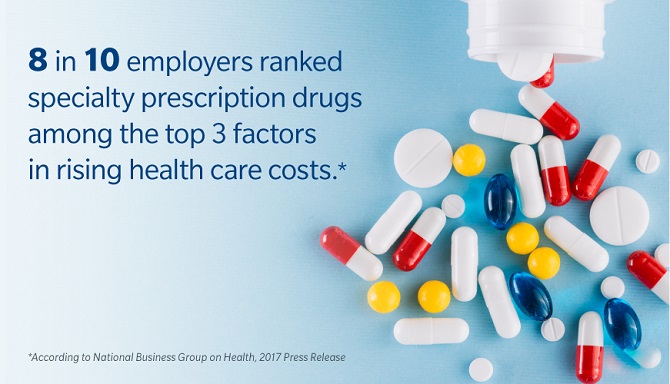What’s one of the fastest growing components of health care costs?
Prescription drug benefits, and in particular, specialty drugs that are increasingly prescribed by doctors. Specialty drugs are high-cost prescription medications used to treat complex chronic conditions like cancer, rheumatoid arthritis and multiple sclerosis.
Ten years ago, specialty prescription drugs represented only 13% of pharmacy spend, but that percentage is projected to jump to 50% by 2020. While specialty medications represent only 1% to 3% of prescriptions written by medical professionals, they account for 35% to 40% of all pharmacy spend, according to MMA Rx Solutions team member, John Tackman.
A growing expense
• According to National Business Group on Health, specialty pharmacy costs were considered the top driver of rising health care costs in 2017. Eight in 10 employers ranked it among the top three factors in pushing health care costs higher.
• The top five most expensive specialty pharmacy drugs cost, on average, $104,000 annually. There are 2,300 drugs in the development pipeline, of which 2,000 are specialty drugs.
• Over half of Americans take at least one prescription. One in five take four or more prescription drugs on a regular basis, according to the Kaiser Family Foundation.
• Rising drug costs aren’t going away any time soon. In aggregate, U.S. drug spending was estimated to be nearly $500 billion in 2018 and an estimated $610 billion by 2021.
What can companies do?
Employers with fully insured health care plans often have difficulty controlling this cost component.
In fully insured plans, the medical and pharmacy benefits are bundled. As a result, there is no transparency regarding the underlying elements of cost. Thus, most employers have no idea which components of their plans are contributing the most to the rising expense.
In contrast, self-funded models help employers better understand their underlying costs and potentially negotiate more favorable terms directly with the health care providers.
Typically, most companies work with an insurance broker or consultant to decouple these line items to lower costs. By renegotiating the prescription drug agreements, employers can ensure they are paying the least amount possible and root out hidden fees.
To be sure, self-funded plans are not for every company. Determining if this is the right approach for your company requires a fundamental assessment of your firm’s financial strength, claims history, and risk tolerance among other factors. An expert employee benefits broker can perform that analysis.
Self-funded success story
One California-based organization recently realized the benefits of a self-funded plan by working with MMA Rx Solutions, a consultative solution offered by Marsh & McLennan Agency.
In working with the organization, the Rx Solutions team renegotiated the company’s previous contract. The new agreement included improved unit pricing, revised contract language and rebate cost-sharing. In the first year, the employer saved $250,000 without changing plans, pharmacy network or clinical programs.
To date, MMA Rx Solutions has helped save more than $100 million across 215 self-funded clients. Seventy percent of those employers remained with their current pharmacy benefits manager.
Expertise is critical
Lowering pharmacy costs requires extensive knowledge to decipher the often-enormous complexity in pharmacy contracts.
That expertise includes analyzing the current cost structure and developing incentives to encourage employee purchasing behavior. Groups that successfully implement a self-funded strategy can see a 5x return on their investment and realize significant savings.
Employer-provided health benefits are an expected part of an employee’s compensation and critical recruitment and retention tool. Working with a skilled broker, employers can offer these benefits, while exercising greater control over health care costs.
Learn more about MMA’s Rx Solutions and how your organization can implement a better approach to pharmacy management at https://mma.marshmma.com/rx-solutions
Brian Hegarty is a Principal and Managing Director of the L.A. office at Marsh & McLennan Agency (MMA). Brian specializes in employee benefits programs for mid-size to large companies, working closely with many leading L.A. industries such as technology, entertainment, apparel, and hospitality, among others.
As a principal at Marsh & McLennan Agency’s (MMA) Employee Benefits Division in San Francisco, Alan Ikeya oversees business development for the division and manages client relationships. Ikeya has extensive background working with leading biotech, management consulting, healthcare, high-tech and construction companies.

